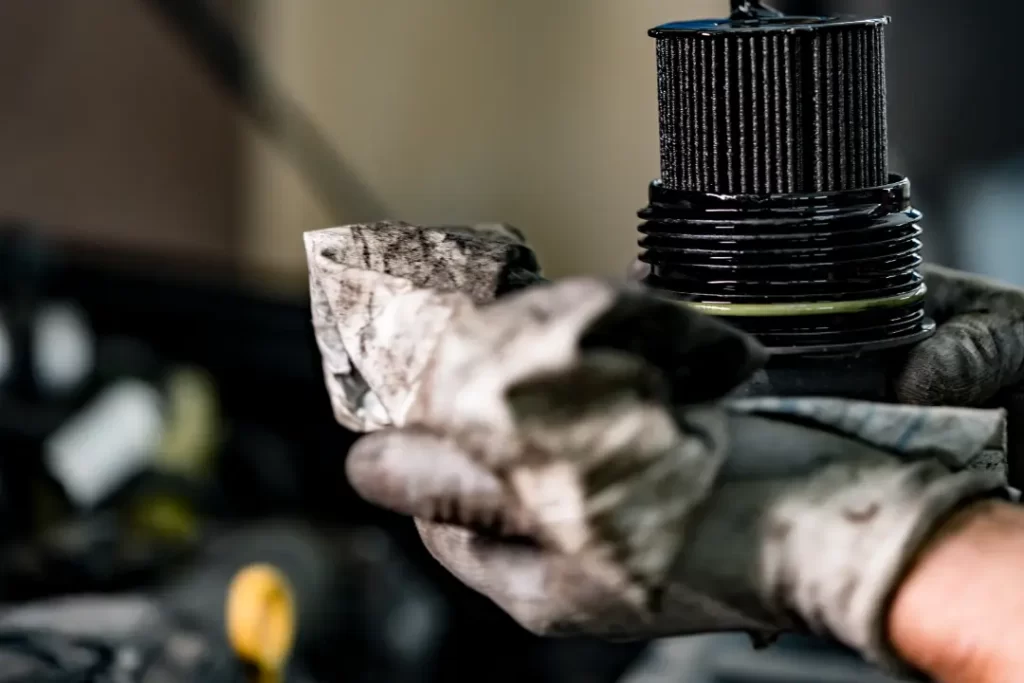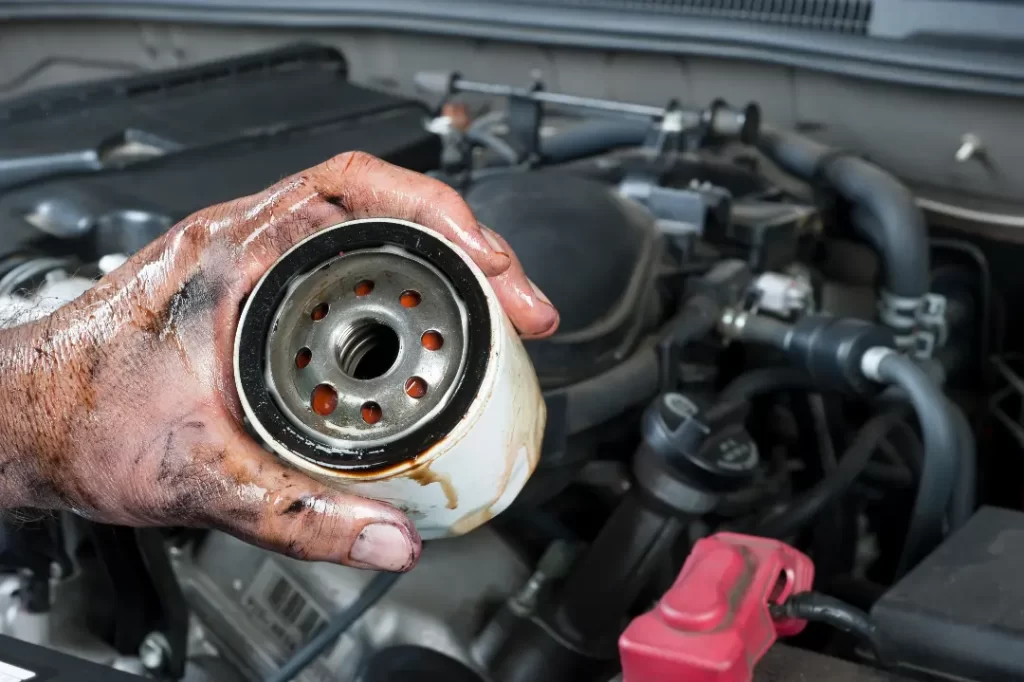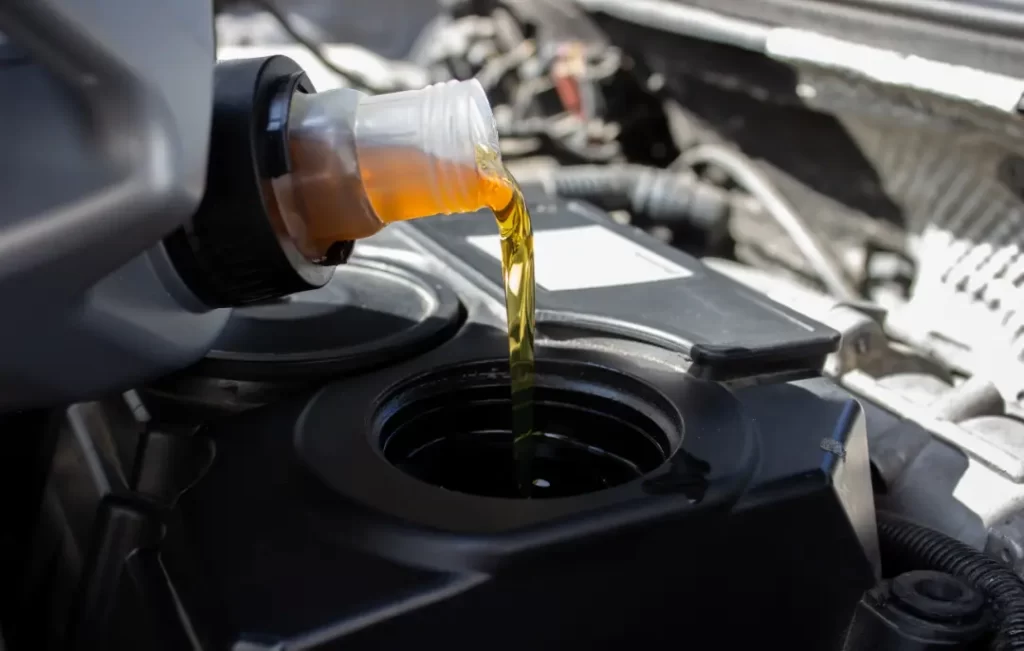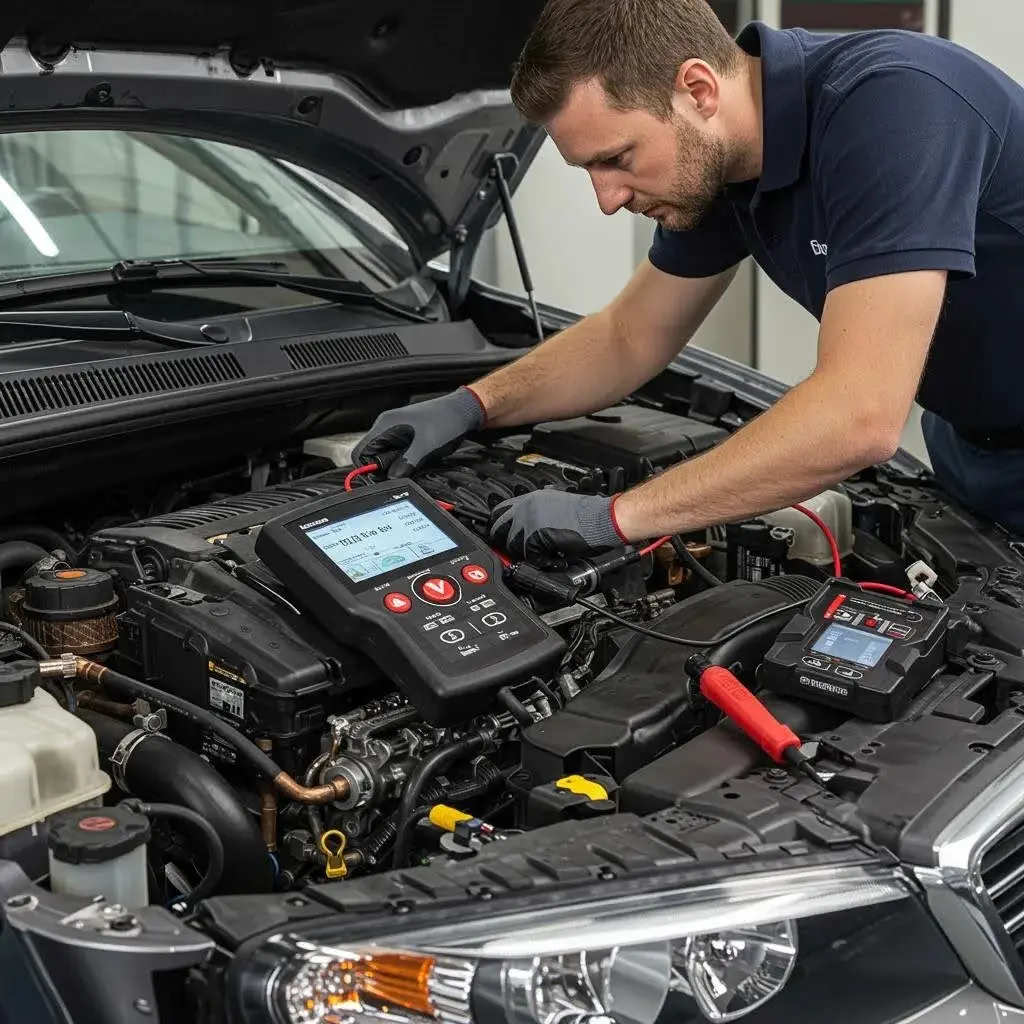What happens if you don’t change the oil and filter? In short, neglect leads to premature engine wear and potentially irreversible damage. Our article strips away the myths and delivers the hard truths about the perils of skipping this critical maintenance step. Discover why consistent oil and filter changes are the linchpins of a healthy vehicle.
Key Takeaways
- Regular maintenance, including oil and filter changes, is crucial for engine health. It prevents premature wear, maintains efficiency, and avoids engine failure due to contaminants and overheating.
- Neglecting oil changes can lead to increased friction and wear, sludge buildup that blocks oil flow, reduced fuel efficiency, and, eventually, costly engine repairs or failure.
- Consistent oil and filter changes are essential preventative measures for vehicle longevity. Synthetic oils offer extended intervals and superior protection for modern car engines.
The Vital Role of Engine Oil and Oil Filters
Engine oil, often considered the lifeblood of your vehicle, performs an essential function by enabling every moving part within the engine to operate with minimal friction and optimal efficiency. Without the proper lubrication of engine oil, the engine components would grind against each other, leading to premature wear and a potential breakdown. Imagine motor oil as a protective barrier that not only safeguards engine parts from grinding down but also plays a significant role in dispersing heat. This heat distribution is essential to maintain a balanced temperature throughout the engine, protecting it from the ravages of overheating.
The often-underestimated oil filter plays a similar role, acting as a guardian that prevents contaminants like dirt, debris, and metal shavings from reentering the engine. A clean oil filter ensures that the oil remains pure, but a dirty filter can lead to severe issues, including inadequate lubrication and, eventually, engine failure. Regularly changing the oil filter is as important as the oil change itself, ensuring that only clean oil circulates to keep the engine running smoothly.

The Consequences of Skipping Oil Changes
Overlooking the necessity of changing oil and filters amounts essentially to gambling with your vehicle’s health. Over time, engine oil can become a toxic sludge that clings to engine surfaces, impeding function and leading to severe damage. It’s not just about keeping the engine running; it’s about ensuring that it doesn’t come to a catastrophic halt.
Neglecting this vital maintenance could result in increased fuel consumption, reduced efficiency, and in the worst-case scenario, engine failure.
Oil Breakdown and Engine Contamination
With age, engine oil loses its beneficial properties, transforming from a friend to a foe. The deterioration of oil leads to the following:
- Increased friction and engine wear due to the abrasive contaminants that accumulate within it
- Sludge that clogs up the pathways that oil should flow freely through, impeding proper lubrication and cooling
- Gritty particles or metal shavings in the oil are a clear sign of a compromised filter or excessive engine wear.
These signs indicate that the oil needs to be changed and the engine requires attention.
Frequent oil changes with fresh oil go beyond mere recommendation; they serve as a safeguard against the incremental degradation that can adversely affect your engine’s performance over time. Dirt, debris, and even small amounts of water mix with the oil, creating acids that corrode engine components, leading to irreversible damage. The simple act of replacing old oil with new can prevent this slow poison from wreaking havoc on your vehicle’s heart.
Oil Starvation and Lubrication Failure
A clogged oil filter is a ticking time bomb for your engine. It can cause oil starvation, a dire situation where the engine is deprived of its most essential fluid. When oil cannot reach the crucial components of the engine due to a blockage, it leads to unfiltered oil circulating. This dirty oil carries contaminants that grind away at the engine, expediting wear and increasing the risk of a breakdown. The lubrication of engine oil usually checks the engine’s excessive heat produced by controlled detonations. Still, without it, the engine’s temperature can skyrocket, damaging the parts not cooled by the radiator.
While oil filters are designed with a bypass valve to prevent complete oil starvation, the oil that does make it through is unfiltered, carrying the very abrasives that the filter is meant to catch. This situation underscores the importance of maintaining oil pressure and ensuring your engine runs on clean oil, not a concoction of wear-inducing particles.
The Downward Spiral: Reduced Fuel Efficiency and Increased Costs
Overlooking oil and filter changes has consequences beyond the engine—it impacts your finances most significantly. Contaminants in engine oil can deposit themselves on components critical to efficient combustion, like fuel injectors and valves, leading to increased fuel consumption. The double whammy of compromised fuel efficiency and the additional fuel cost directly results from ignoring the simple task of changing the oil. When the oil flow is obstructed, the engine works harder, operates at higher temperatures, and drinks more fuel.
The result? More frequent trips to the fuel pump and a looming threat of costly engine repairs. These issues lead to reduced performance and increased wear, a path that any prudent car owner would do well to avoid.
Consistent maintenance is the secret to maintaining fuel efficiency and controlling fuel costs.
Signs It’s Time for an Oil and Filter Change
Your vehicle is proficient at signalling when a change is needed, specifically regarding oil and filters. An illuminated oil pressure warning light is like a distress flare, indicating that the engine’s oil pressure isn’t what it should be and that you may be overdue for an oil change. If you’re experiencing decreased engine performance, rough idling, or trouble starting the car, these are your engine’s way of saying, “I need a clean filter, and I need it now”.
Moreover, if your oil has turned to a murky, dark sludge or exhibits a gritty texture, it’s a clear sign that contaminants have taken over, and it’s high time to replace the oil and the filter. Ignoring these signs is like ignoring a check engine light—doing so can lead to dire consequences that are both avoidable and unnecessary.

Sovereign Motor Engineers: Your Partners in Car Maintenance
At Sovereign Motor Engineers, our ten years of commitment extends beyond mere car repairs—we focus on building relationships with car owners and their vehicles. Established in 2010 in Tonbridge, we’ve built our reputation on providing comprehensive automotive services for all makes and models. From MOTs to full engine repairs, diagnostics to sales, our garage is a hub for those who seek excellence in car servicing. Our technicians, with their high level of skills and training, ensure that every service, especially complex ones like engine repairs, meets the highest standards, fostering customer loyalty.
Our passion extends to classic cars, where our expertise shines as brightly as the polished chrome on a vintage MGB. We’ve proven ourselves with tasks ranging from gearbox replacements to fitting new rear leaf springs, earning the trust and satisfaction of classic car enthusiasts. Customers often share their delight with our honest and friendly service, cementing our reputation as a trusted partner in car maintenance.
Why Choose Sovereign Motor Engineers for Your Oil Service?
Opting for Sovereign Motor Engineers for your oil service involves entrusting your vehicle to a team that holds honesty and friendly service in high regard, just like you. Our technicians are not just qualified; they are specialists who bring over a decade of experience to every oil change, ensuring that your classic or modern car gets the attention it deserves. We take pride in our work, and that includes using only the highest quality vehicle components, guaranteeing the longevity and reliability of your car.
When you bring your car to Sovereign, you choose a service that exceeds the standard. It’s about a shared passion for vehicles and a commitment to maintaining your car’s heartbeat—its engine. Let us keep your engine running smoothly with an oil change that’s as thorough as it is thoughtful.
Preventative Measures: Regular Oil and Filter Changes
In the realm of car maintenance, the adage ‘Prevention is better than cure’ translates into following recommended service intervals for oil and filter changes. These intervals, typically ranging from 3,000 to 10,000 miles depending on your driving conditions, are not just arbitrary numbers—they are the benchmarks of automotive health. Neglecting to change oil and filters can lead to a contaminated and ineffective lubricant, setting the stage for potential engine damage and other issues.
Adopting a proactive approach to vehicle care can save you from the pitfalls of reactive repairs, which often come with a hefty price tag. Regular oil changes are a small investment in your car’s overall health and longevity. Embrace this best practice, and your vehicle will reward you with reliable service mile after mile. Regularly changing your engine oil ensures a smoother ride and better performance.
Understanding Synthetic Oils and Modern Cars
The automotive realm is constantly evolving, as are the fluids that ensure our engines run smoothly. Synthetic oils, with their superior protection against heat and oxidation, pave the way for longer intervals between oil changes and heightened engine efficiency. Their stability across temperature extremes means engine sludge is kept at bay, safeguarding your vehicle’s heart. Whether you choose conventional, semi-synthetic, or full synthetic oil, each type offers different benefits, with full synthetic being the gold standard for engine protection.
Modern cars are engineered to higher standards and often require synthetic oils that can keep up with their performance demands. You could look at change intervals extending up to 15,000 miles with synthetic oils, although the exact figure should always be aligned with manufacturer recommendations. Embracing synthetic oils is embracing the future of automotive care, ensuring that your modern car runs with the efficiency and protection it was designed to offer.

DIY vs. Professional Oil Changes: What You Need to Know
Handling oil changes yourself can be gratifying, saving time and money. The materials might set you back around $30 to $45, and though there’s the initial investment in tools, these costs can be recouped over time. For those with the know-how, a DIY oil change can be done swiftly, bypassing the wait times of professional services. However, it’s imperative to follow recommended procedures meticulously to ensure a successful oil change.
Conversely, opting for professional oil change services offers added perks such as service reminders and expert advice. The convenience of having a professional handle your oil change cannot be overstated, especially if you value peace of mind and assurance that every detail is taken care of.
Whether you choose to get your hands dirty or leave it to the experts, what matters most is that the oil change is done correctly and at the right intervals.
Summary
In the grand scheme of vehicle maintenance, the importance of regular oil and filter changes cannot be overstated. From the vital role of engine oil in lubrication and cooling to the consequences of neglect, we’ve explored the integral connections between maintenance and vehicle performance.
Sovereign Motor Engineers stands ready to partner with you in maintaining your vehicle’s health, ensuring that every journey is as smooth as the last. Embrace the preventative measures, understand the benefits of synthetic oils, and choose the oil change route that suits you best. The road ahead is clear; it’s time to ensure your engine’s future is, too.
Frequently Asked Questions
How often should I change my oil and filter?
Depending on your vehicle and driving conditions, you should change your oil and filter every 3,000 to 10,000 miles.
What are the consequences of not changing my engine oil regularly?
Failing to change your engine oil regularly can lead to sludge buildup, increased friction, and engine wear, eventually causing engine failure and increased fuel consumption. Maintaining a regular oil change schedule is crucial to avoid these consequences.
Can synthetic oil extend the interval between oil changes?
Yes, synthetic oils can extend the oil change interval, sometimes up to 15,000 miles, based on the manufacturer’s recommendations.
What are the signs that it’s time for an oil and filter change?
If you notice an illuminated oil pressure warning light, decreased engine performance, rough idling, or dark and sludgy oil, it’s time for an oil and filter change. Keep an eye out for these signs to maintain your vehicle’s performance and longevity.
Why should I choose Sovereign Motor Engineers for my oil service?
You should choose Sovereign Motor Engineers for your oil service because they offer expert care with over 10 years of experience, high-quality components, and a passion for vehicles that ensures your car receives the best service possible.




